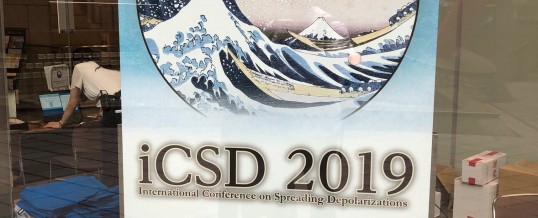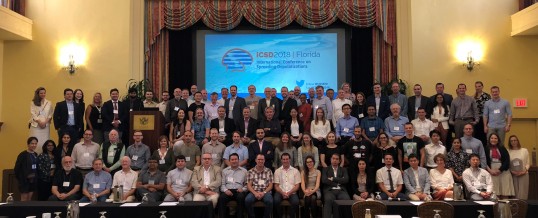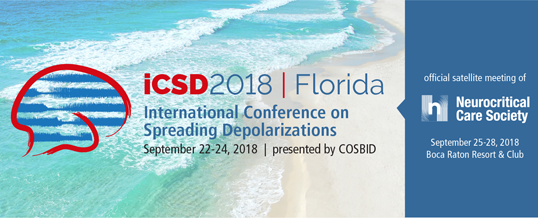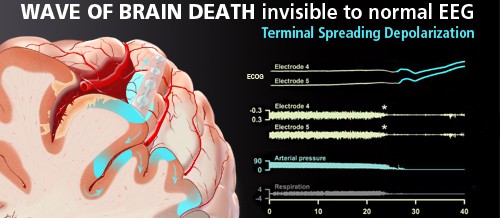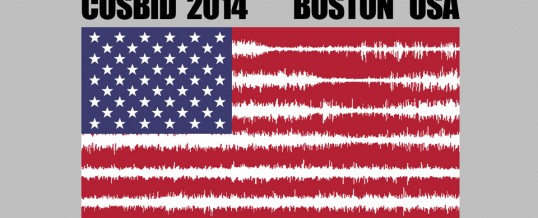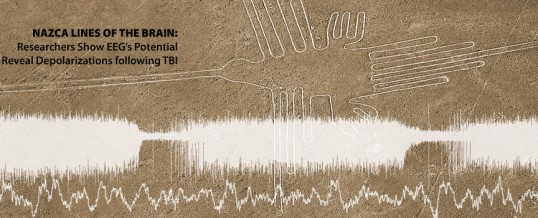Images from the iCSD 2018 – Boca Raton. Follow meeting highlights on Twitter https://twitter.com/COSBID
Call For Abstracts – iCSD2018 Meeting
Posted by:
We are pleased to announce that the International Conference on Spreading Depolarizations (iCSD) is now open for abstract submission and registration! iCSD is an annual meeting of translational neuroscience dedicated to the study of spreading depolarizations/depression and their role in neurological disease. This year’s meeting will be held in Boca Raton, Florida on September 22-24, 2018, as an official satellite of the Neurocritical Care Society. The meeting is open to attendance by those from diverse scientific and medical backgrounds.
Abstract Format and Submission
Continue Reading →
A new study furthers research on “brain tsunamis” and provides insight into the neurobiology of dying.
Researchers monitored a group of 9 patients who suffered devastating brain injuries caused by brain trauma or subarachnoid hemorrhage (bleeding after a brain aneurysm rupture). When the patients failed to respond to treatment in the intensive care unit, their families signed a Do Not Resuscitate (DNR) order and requested that their loved ones receive only comfort care.
Over the next moments, researchers studied the sequence of ...
Continue Reading →“A Sea of Depolarizations”
Report from 17th COSBID Meeting in Elsinore, Denmark
Sixty-six delegates from 3 North American and 8 European countries as well as Japan convened for the 17th COSBID meeting, held September 9-11, 2015 in Elsinore, Denmark. The scientific meeting as well as social events took place at the beautifully situated Konventum centre, nestled among forests on the northern seas of Ore Sound.
The meeting started with an evening talk by Maiken Nedergaard, of Rochester, NY and Copenhagen, ...
Continue Reading →We are excited that JCBFM has selected the COSBID group for a special issue of the journal. Editors Martin Lauritzen and Ulrich Dirnagl initiated the format of special Clinical Issues to increase representation of clinical and translational research topics in the journal. The inaugural Clinical Issue, published in 2015, will be devoted to the topic of vascular dementia. The next issue will focus on brain injury depolarizations, with contributions in clinical and basic science from COSBID researchers. Publication in 2016 ...
Continue Reading →http://www.sciencedirect.com/science/article/pii/S0896627315000963
Contratulations to Daniel von Bornstadt and collegues on publishing this landmark paper in Neuron (Vol 85 Issue 5, p1117-1131, 2015). This is the first work to directly address, and document with extensive experiments, why and how spreading injury depolarizations (or PIDs) occur in ischemic penumbra. This study clearly shows that depolarizations, while appearing spontaneous, arise when energy supply-demand mismatches occur in a narrow penumbral ‘hot-zone’, thereby depleting local tissue oxygen and tipping the balance toward ionic failure. Particularly interesting is that 2 hot-zones ...
Continue Reading →International Stroke Conference
Posted by:
 Great idea by Cenk Ayata to organize a symposium accepted at the International Stroke Conference in Nashville, TN. The Spreading Depolarization session kicked off the meeting with a bright and early 7AM start on February 11. The theme was ‘Triggers, Modulators, and Causation’ related to SD. Cenk Ayata, Oliver Sakowitz, Jed Hartings, and Jens Dreier gave ...
Great idea by Cenk Ayata to organize a symposium accepted at the International Stroke Conference in Nashville, TN. The Spreading Depolarization session kicked off the meeting with a bright and early 7AM start on February 11. The theme was ‘Triggers, Modulators, and Causation’ related to SD. Cenk Ayata, Oliver Sakowitz, Jed Hartings, and Jens Dreier gave ...
COSBID Meeting Boston 2014
Posted by:
What a great meeting we had in Boston, with over 50 attendees from multiple countries. Thanks to Cenk Ayata, Brandon Westover, and Eric Rosenthal for putting together a fantastic program. We appreciate the generous support from our sponsors, and especially thank Moberg Research for donating T-shirts with this creative patriotic design to commemorate the occasion.
Continue Reading →CINCINNATI – The potential for doctors to measure damaging “brain tsunamis” in injured patients without opening the skull has moved a step closer to reality, thanks to pioneering research at the University of Cincinnati Neuroscience Institute.
The research team, led by Jed Hartings, PhD, Research Associate Professor in the Department of Neurosurgery, has shown that spreading depolarizations — electrical disturbances that spread through an injured brain like tsunami waves — can be measured by the placement of electroencephalograph ...
Continue Reading →
